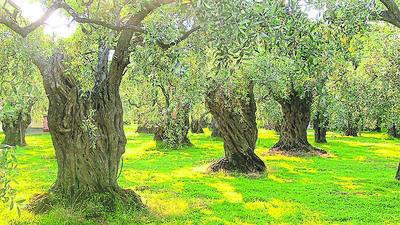‘But the fruit of the Spirit is love, joy, peace, patience, kindness, goodness, faithfulness, gentleness and self-control’ (Galatians 5:22-23).
These verses offer us a beautiful portrait of the fruit of the Holy Spirit. This ‘fruit’ is a cluster of nine interdependent (rather than independent) attributes that bear evidence of the work of the Spirit of God in the life of the Christian.
As believers we are challenged to live victorious and Christ-like lives. Dynamic Spirit-filled lives testify to the resurrection power of the gospel and glorify God. A desire for the fruit of the Spirit should have a large place in our personal and corporate prayer – for we desire to be like Jesus, who manifested this fruit in abundance.
Accepting all the Spirit’s graces
We should speak of ‘fruit’ rather than ‘fruits’ because we are encouraged here not just to manifest some of these qualities but all of them.
If there were more love, then all the other graces listed would flow from it in abundance. If there were more patience there would be greater self-control (and vice-versa) and peace would prevail, and so on.
We are not at liberty to pick and choose which virtues we will nurture. We cannot say, for example, ‘I am not a very patient person but I can show kindness – so I will focus on that instead’.
These fruit taken together sum up the nature of mature Christian character. The colours that compose white light are seen only when that light is refracted, as in a rainbow or by a prism. Together they vitally illuminate everything else.
We may speak of the fruit of the Spirit as nine separate qualities but in reality they form a unit that affects everything else around us.
Good fruit
I remember from my childhood the huge apple tree in the garden at home. It was the biggest and most bountiful apple tree I have ever seen. I remember too that a neighbour had an identical tree in type and size. Obviously the soil suited the growth of these spectacular specimens.
But whereas our tree bore big, sweet apples, the neighbour’s tree bore smaller, less tasty fruit. Although I claim no horticultural expertise, I can think of two reasons why that was so.
The first is that our tree was situated in a cultivated garden whereas the neighbour’s tree stood in a garden that was overgrown and untended. My father grew vegetables and we also had other fruit-bearing shrubs.
He never intentionally managed that old apple tree by pruning it or treating it with pesticide. But I believe that in taking care of the little things in the garden – such as weeding, liming against slugs and digging in manure to fertilise the soil – the tree benefited from a healthy environment. My father’s garden was free from pests and disease and that was beneficial to the production of fruit.
This has a bearing on our exploration of the fruit of the Spirit. If we tend to the little things among ‘love, joy, peace, patience, kindness, goodness, faithfulness, gentleness and self-control’then all the fruit will thrive.

However, if we neglect the little things and allow the garden to become overrun, the quality of the fruit will decline.
The need for light
The second reason why our apple tree was bountiful relates to the first. The neighbour’s garden was so overgrown that the weeds actually formed a canopy that blocked a lot of light from getting to his tree. It was always in shade and never in sunshine.
By contrast there was plenty of light getting through to our tree. Plants need light – and so do people. Through its foliage, a tree converts light into useable energy by the process of photosynthesis, thus sustaining its life and health. Without light the tree will struggle to be what it ought to be.
Similarly, the Christian needs the light of the Word of God illuminating his life if he is to be spiritually healthy and happy. As we approach Scripture each day, it is not enough to make observations and interpretations of that Word. We must apply that Word in our lives.
The light of God’s Word must penetrate to our hearts and minds to produce the divine energy needed for bearing fruit to God’s glory.
I recall that apple tree in our garden with its boughs bending under the weight of clusters of juicy apples. I never think of it as dutifully fulfilling its obligation to bear fruit! Every year it clothed itself in leaves, burst into bloom, and eventually bore fruit.
Divine attributes
Another important observation is that the text refers to these graces as the fruit of the Spirit (note the capital ‘S’). They are not the fruit of the human spirit but of God’s Spirit. This is crucial to our understanding of the text.
Think about it. Each of the characteristics listed in Galatians 5:22-23 is a divine attribute before it becomes a human characteristic. These verses are about what God the Holy Spirit produces in the lives of Christ’s disciples – not what we may summon up from within our own resources.
It cannot therefore be about playing to our strengths and ignoring our weaknesses – so that we opt for kindness because we feel we can be kind but ignore patience because we feel we are just not wired that way.
It is God who is at work in us to produce all of these qualities, so that we may reflect and represent the true nature of the one whose noble name we bear as Christians.
Communing with God
The fruit of the Spirit is the outcome of unhurried daily communion with God, through which we are continuously being changed into Christ’s likeness (2 Corinthians 3:18). This is God’s ultimate purpose for the believer.

It is instructive to recall the occasion when Moses came down from Mount Sinai with the commandments. We read, ‘When Aaron and all the Israelites saw Moses, his face was radiant’ (Exodus 34:30).
Some years ago I took my family on holiday to Donegal in Ireland, where we had two weeks of glorious sunshine. However, the rest of the country was experiencing very different weather.
In the evenings when we watched the news on television we could hardly believe what we saw – cattle stranded in flooded fields, drowned sheep, ruined crops, rivers bursting their banks and homes flooded!
It was truly awful – and truly amazing that we had escaped such terrible conditions. During that holiday we spent our days on a little beach swimming, sunbathing, playing games and reading.
Results
One result of this time of rest and recreation was that when we returned home it was evident we had been in the sunshine. People asked if we had been on a foreign holiday!
I relate this not to make the obvious point that if you spend time in the sun it will be apparent to others but to suggest that if we spend time with the Son we will radiate something of him!
In Acts 4 we read of Peter and John being taken before the Sanhedrin for preaching the gospel. Verse thirteen of that chapter tells us something interesting. There we read, ‘When they saw the courage of Peter and John and realised that they were unschooled, ordinary men, they were astonished and they took note that these men had been with Jesus’.
Both their courage and their knowledge are identified as traits associated with the character and influence of Jesus. Thus also the fruit of the Spirit are evidences of our companionship and communion with Christ.
The key to fruitfulness
Such graces advance harmony and unity in the church and testify to the watching world that God has given something special to his people. As such, the fruit of the Spirit assists our proclamation of the message of the gospel – by enabling us to live out the reality of God’s grace in our homes, workplaces, colleges and communities.
If we want to be effective in evangelism we must attend to this area of our life in the Spirit.
The key to Christ’s fruitful life on earth was his union and communion with the Father. For example, Luke tells us that ‘Jesus often withdrew to lonely places and prayed’ (5:16). Frequent and fervent prayer indicates the reality of dynamic spiritual relationship.
At the heart of his discourse on the Holy Spirit in John 14-16, Jesus speaks about the intimate and organic relationship his disciples ought to have with him. ‘I am the vine; you are the branches. If a man remains in me and I in him, he will bear much fruit’ (John 15:5).
Our fruitfulness is found in Christ, and we are dependent on him through his Spirit for all such grace in our lives. Abiding in his fulness produces abundant fruit.







